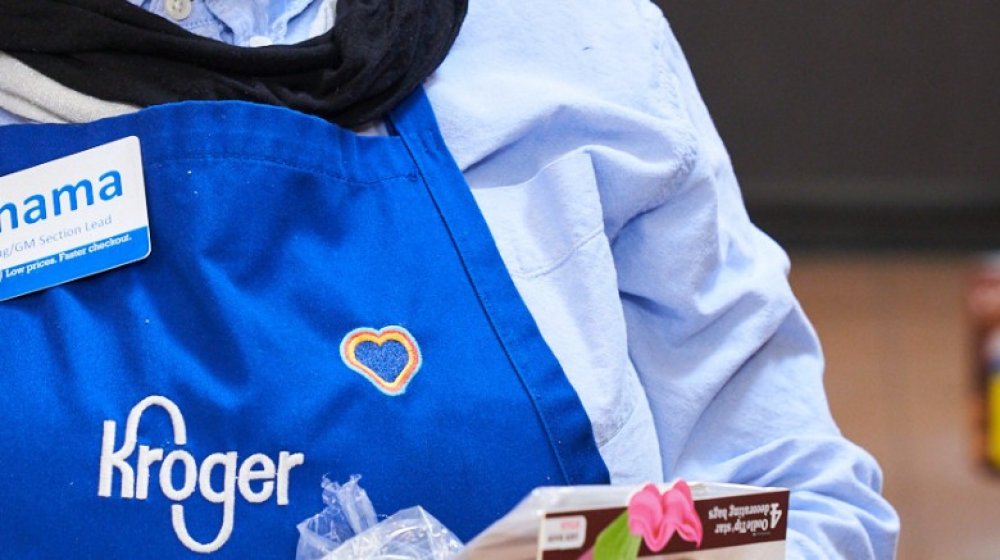Why The U.S. Just Slapped Kroger With A Lawsuit
The United States Government's Equal Employment Opportunity Commission is taking Kroger to court, alleging that they've violated Title VII of the Civil Rights Act of 1964. The case centers around small, light blue, dark blue, red, and yellow embroidered hearts that Kroger implemented as part of its dress code in April 2019. A Twitter sleuth suggests that the hearts were part of a Kroger "promise campaign" and that its colors represented its four tenets: everyone friendly and caring, everything fresh, uplift every way, and improve every day. The supermarket chain itself has yet to formally confirm or deny this (via Arkansas Democrat-Gazette).
Whatever the case, two Conway Arkansas Kroger employees, Brenda Lawson and Trudy Rickerd, firmly believed that the hearts violated their religious beliefs. According to the EEOC's filing, Lawson and Rickerd saw the embroidered heart as a symbol of LGBTQ pride (via The Miami Herald). Because the two women believe that homosexuality is a sin, they refused to wear (or covered up) the hearts. "Wearing the logo showed (their) advocacy of the community, which (they) could not do," stated the EEOC's filing. In late May and early June 2019, both Lawson and Rickerd were fired from Kroger.
LGBTQ-friendly media organizations have since pointed out that Kroger's heart does not evoke Pride in the slightest. They note that half of the Pride flag's colors aren't even there, and the colors aren't present in equal amounts.
What the EEOC's lawsuit against Kroger claims
After Kroger's April 2019 uniform change, both Lawson and Rickerd attempted to negotiate with Kroger, offering to wear the apron and cover up the heart with their nametags or to buy another apron, sans the heart. Kroger denied their requests. Per the filing, "(Kroger) refused to accommodate the religious beliefs of Lawson and Rickerd, and disciplined and terminated them because of their religious beliefs and in retaliation for requesting a religious accommodation," the EEOC said in the complaint.
The EEOC is not only seeking back pay, compensatory damages, and punitive damages for the two women (via Advocate), but is also demanding that Kroger institute policies "which provide equal employment opportunities for Lawson and Rickerd and which eradicate the effects of its past and present unlawful employment practices." Explaining the case, Delner-Franklin Thomas, district director of the EEOC's Memphis District Office, said, "The EEOC protects the rights of the LGBTQ community, but it also protects the rights of religious people."
Meanwhile, since 2017, when lawyer Janet Dhillon was nominated by President Trump to take over the EEOC (she assumed the post in 2019), civil rights organizations have been sounding alarm bells. "We are concerned that the nominee to lead the federal agency that promotes equal opportunity for employees has no experience doing so, and instead has spent her career advancing the interests of, and defending, large corporate employers," wrote a coalition of organizations working towards women's, gender, workers' and immigrants' rights.

